Monthly Archives: December 2017
Outdoor Recreationists, the ranchers of tomorrow?
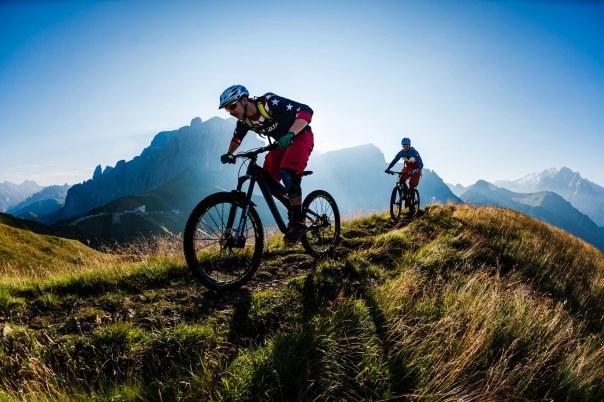
Photo credit: Mattias Fredriksson, Redbull.com
Most recreationists who are even slightly aware of land management issues on public lands are familiar with the Bundys and their stand against the government. It is safe to say that most think the Bundys are mistaken in their approach to public lands. It is equally safe to say that none would put themselves in the same category as the Bundys. Recently; however, the House Committee on Natural Resources voted to amend the Wilderness Act to allow bicycles in wilderness areas at the behest of some in the mountain biking community.
Ted Stoll, founder and executive director of the California-based Sustainable Trails Coalition, who is the author of this bill, has been seeking out help from the very representatives actively trying to take public lands – and why wouldn’t he go to the representatives who value wilderness areas the least? While Stoll and his supporters followed the legislative process and did it the legal way, in contrast to how the Bundys have been doing it, their efforts to mine the ground of protected wilderness landscapes, whether they intended it or not, are providing the first in-roads for opportunists seeking similar access with designs of their own.
In 1960 Wallace Stegner wrote what has come to be known as The Wilderness Letter. It was written to the Outdoor Recreation Resources Review Commission regarding recreation in wilderness. In it he states that recreation has no more to do with wilderness than it does with churches or with the “American Dream” and argued against recreation in wilderness areas because the idea of wild places existing was more valuable than peoples’ access to recreational experiences in them.
 He went on to explain how the wild landscape of our country built and forged our national character making us who we are, giving us quiet and solitude from the industrial and technological world we created, and that wilderness, however impractical to some, provides blessings of a spiritual kind to those who enter, and can calm those who simply contemplate it.
He went on to explain how the wild landscape of our country built and forged our national character making us who we are, giving us quiet and solitude from the industrial and technological world we created, and that wilderness, however impractical to some, provides blessings of a spiritual kind to those who enter, and can calm those who simply contemplate it.
Our national identity and character is without question linked to the land. The expansion westward shaped the people of this Nation as surely as the Revolution did; it’s in our blood to roam and get caught up in the vast landscape of our country. People not born here but who choose the United States as home can sense it and feel and immerse themselves in it as well.
Stegner said, “The American experience has been the confrontation by old peoples and cultures of a world as new as if it had just risen from the sea. That gave us our hope and our excitement, and the hope and excitement can be passed on to newer Americans, Americans who never saw any phase of the frontier. But only so long as we keep the remainder of our wild as a reserve and a promise–a sort of wilderness bank.”
We should not forget our history or the untamed land from which it grew; and in remembering, we should fight to preserve and protect it.
Our protection should come from a place of gratitude. We enjoy rights, access, and a standard of living built on the experiences and lessons learned from those who came before us. Few of us have lived in a place or time where we could not drink the water, breathe the air, or eat the food. That is a blessing many in the world do not have.
Few of us have witnessed rivers catch on fire due to pollution, or watched thousands die as industrial smog settled over a city, or have had to live with the slow death caused by contamination or living down wind or down river of noxious poisons or toxins. Few of us have seen wildlife die slow and agonizing deaths from lead poisoning or pesticides. This is because people before us learned that “progress” has costs and passed legislation and implemented regulations in order to protect life and a basic standard of living. But that doesn’t mean it will stay this way.
We could be the ones who let it slip away. It is on us now to decide if we will maintain our collective civic conscience that ensures benefits for the good of all of us. Either our hard work or our complicity will shape the lives of those who come after us. As Gifford Pinchot said 100 years ago about our generation, “Our duty is to the future. To ensure that people in 2010 have a country of clean water, healthy forests, and open land will require battle with certain groups, namely the alliance between business and politics.” What will the generation 100 years from now have to say of what we passed on to them?
Today we stand witness to decisions being made by an administration that is undoing much of the hard work done by American pioneers – much of it the manifestation of the alliance between business and politics. We are witnessing a heretofore unseen zeal to slash and burn through historic and unprecedented ethical human progress, progress that revealed our values and character to the world, and it is being done without a care. It is such an overwhelming attack that it will take generations to fix and recover from if we do nothing to stop it – and that work will have to be done by our children and their children.
The policies being dismantled, and the decisions being made today, foretells a future where we might very well live to see access to our public lands disappear. Situations like the water crisis in Flint, Michigan might become the norm. We could see more rivers filled with mine tailings as the EPA is gutted and made inept. We may witness the death of our national forests as climate change moves into fifth gear while we do nothing. Our children’s children may never get the chance to see wild salmon, or hear the howl of a wolf, or experience a starry night because of what we do or do not do right now. We may witness and experience poverty – not just in terms of wealth – the likes of which most of us have never seen, least of which could be the loss of experiencing the last remnants of our wild lands as they were 100 years ago.
According to the Department of Interior, more than 500 million people visit National Parks and Monuments, wildlife refuges, and recreational sites annually. Additionally, the Forest Service statistics shows 173 million visits annually to national forests and 300 million visits to scenic byways and other travel routes near national forest lands. This says nothing of the development around the edges of public lands for people who want to live nearby.
It is safe to say that recreationists are the biggest users of public lands. Because of that, we need to be hyper aware of our impacts on the ephemeral and fragile ideals public lands are founded on and endeavor to protect them. Otherwise, we will be no better than others using public lands for their own selfish ends.
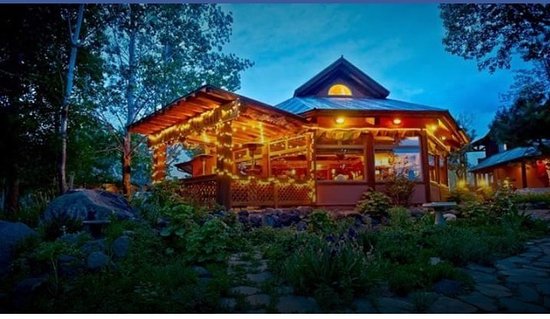
Hell’s Backbone Grill, Boulder, UT – On the edge of Grand Staircase Escalante National Monument, Photo credit TripAdvisor
We should also recognize the economic value our public lands provide to our governments, both national and local, and by proxy, the benefits those dollars bring to us. The Outdoor Recreation Association believes it will be the economy of the future. Right now tourism and recreation make up the fourth largest economic sector in the country with $887 billion in consumer spending annually, bringing in $65.3 billion in federal tax revenue, and $59.2 billion in state and local tax revenue. Where do those billions of dollars go? Defense spending? Funding NASA? Roads? Medicaid?
Furthermore, what these numbers do not show is the amount of revenue brought in by international tourists and recreationists. Those dollars are paid by non-citizens who through their spending directly benefit us in terms of tax revenues that we ourselves do not have to pay.
Some in the outdoor industry recognize this, but none are on the forefront of this battle more than Patagonia. If there is a growing movement, they are the tip of the spear. We are witnessing a David and Goliath show-down between Yvon Chouinard’s Patagonia and the Federal Government that has escalated into anti-Patagonia tweets from government officials and even an invitation to Yvon Chouinard to come to Washington by Rob Bishop (R-Utah).
Patagonia was the first to stand up to Utah politicians pursuing their anti-public lands agenda in a real way by pulling out of the Outdoor Retailer (OR) show when it was clear Utah representatives would not stop their crusade, causing many other companies to follow suit – eventually leading the OR show to another state.
Patagonia really committed itself when it publicly supported, funded, and advocated for the protection of Bears Ears National Monument. They did so for the climbing certainly, but they didn’t do it just for that – as is clear from the public statements the company has made. Patagonia is fighting for the continued experiences that can only be found in wild places– because as Stegner said, “If the abstract dream of human liberty and human dignity became, in America, something more than an abstract dream, mark it down at least partially to the fact that we were in subdued ways subdued by what we conquered.”
In other words, they are fighting for an American ideal – a uniquely American feeling, and the renewal that comes from immersing yourself in the land.

Yvon Chouinard NA Wall, 1964 – Mountain Project
Chouinard is a living example of the combination between the American Dream and the American Spirit. He built a successful company out of the recreational sports he loves. He played in our wild places and helped pioneer gear for others to play in those wild places also – and now he is fighting for those places. Fishing, surfing, and climbing shaped the 70 year old man we see today. He is what Wallace Stegner described as, “…an American, insofar as he is new and different at all, is a civilized man who has renewed himself in the wild.”
Patagonia is an interesting paradox to behold because the outdoor retail industry has largely been an affable yet harmless group more interested in color combinations of zippers on puffy jackets than public policy, seemingly taking for granted the fight it took to get access to public lands that fuels much of their business; an industry “incapable of driving large-scale global change.” (The Big Business of Resist) Despite the potential, they hardly garnered a look from political players.
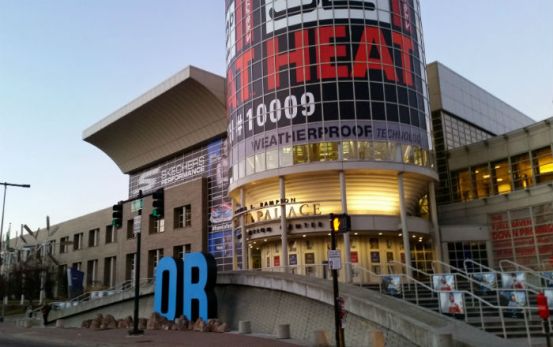
OR Salt Lake City, 2015
When I attended the OR show in 2015 I went to listen to former Secretary of Interior, Bruce Babbitt. I shook my head as I looked around the room at the roughly 300 people in attendance making up a miniscule fraction of the 10,000 that showed up for the OR show. It represented an embarrassingly shallow lack of substance in an industry built on the substance of such individuals as Bruce Babbitt.
Here was a man who came from a ranching family in Northern Arizona who became a lawyer, a governor, and the Secretary of Interior who tackled some of the most complex and controversial issues in public land management resulting in long overdue reforms to mining, grazing, and endangered species law. A man who used his skills as an effective public advocate and teacher to counter the inevitable criticism from political opponents, and was instrumental in defeating the environmental rollback propositions of the Republican’s 1994 manifesto, Contract with America.
Here was a man who was the first Secretary of Interior to restore fire to its natural role in the wild and to tear down dams, restoring river flow into the Atlantic and the Pacific; a man who was personally involved in demonstrating catch and release programs for endangered trout and salmon to highlight how restoring native fish habitats restores economies; the same man who provided recommendations to President Clinton that led to the creation of 21 new monuments protected under the Antiquities Act that are now being undone by President Trump.
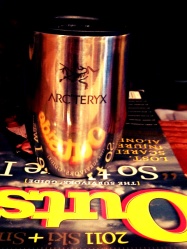
Arcteryx espresso mug from the OR Show
The OR industry turned a deaf ear to this man – until now. Babbitt’s words are reaching once deaf ears like the distant rumble of a long gone train. As if rising from a dead and distant past I can hear him say, “Wake up. Your industry – the $646 billion per year outdoor recreation industry – is a sleeping giant. If you mobilize the full economic and political power of your industry, you can change the debate. The persistent, high-stakes debate about public lands that is.” (Jimmy Tobias, 2015, Outside Magazine)
Patagonia did “wake up” and may finally be garnering Washington’s attention, but they are largely a lone wolf in the outdoor retail industry. Many in the industry are still plugging their ears. Many disagree with Patagonia’s stand, disagreed with pulling out of the OR show, and are playing it safe on the sidelines. Why mess up a good thing?
Many believe that Patagonia will take hard blows and may be destroyed in this fight. Many are shaking their heads at what is surely going to be a long legal battle, wondering if Patagonia has the stamina to go the distance and if the company will end up laying off employees to continue their fight.
Patagonia most certainly has something to lose and it’s more than just retail sales; they have put it all on the line in defense of public lands and therefore, could lose it all. But, as former Secretary of the Interior Sally Jewell said, “If you are not at the table, you are on the menu.” They are clearly at the table now and contrary to high ranking political figures poisoning the well by suggesting that Patagonia is catering to coastal elites, the costs they could incur speaks to the integrity of their fight – a fight we all stand to win or lose.
Wallace Stegner quoted Sherwood Anderson writing to Waldo Frank in his Wilderness letter, “Is it not likely that when the country was new and men were often alone in the fields and the forest they got a sense of bigness outside themselves that has now in some way been lost…. Mystery whispered in the grass, played in the branches of trees overhead, was caught up and blown across the American line in clouds of dust at evening on the prairies…. I am old enough to remember tales that strengthen my belief in a deep semi-religious influence that was formerly at work among our people. The flavor of it hangs over the best work of Mark Twain…. I can remember old fellows in my home town speaking feelingly of an evening spent on the big empty plains. It had taken the shrillness out of them. They had learned the trick of quiet…”
And then said, “We could learn it too, even yet; even our children and grandchildren could learn it. But only if we save, for just such absolutely non-recreational, impractical, and mystical uses as this, all the wild that still remains to us.”
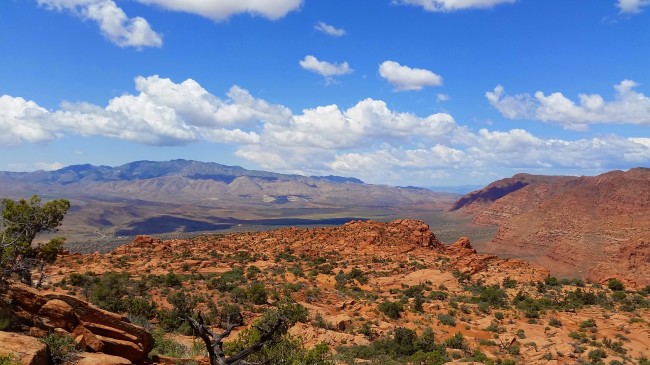
Red Mountain Wilderness Area, UT
Bruce Babbitt said, “This is the moment to apply the strength of your industry to the defense of America’s public lands.”
One could argue that Patagonia is doing just that. It’s not just about climbing or just about sales, it’s about the idea behind real places that provide intangible spiritual value to people who need and yearn for it. The land is a gift available to us that we neither earned nor deserve, but have. This fight is not just worthy, but according to Bruce Babbitt, doable – but we have to engage in it.
Let’s hope the outdoor retail industry can produce impactful results as well as create compelling stories to sell merchandise. Let’s hope Patagonia is not just the tip of the spear, but the tip of the spear with the entire Outdoor Industry Association (OIA) behind it – however active behind the scenes or slow to act they may be. “REI alone, with a membership of 16 million – more than three times that of the NRA – is theoretically capable of exerting enormous pressure on lawmakers.” What could the Patagoniac tribe, REI members, and the OIA bring to the table as a united front?
We need to decide where we stand else we become the ranchers of tomorrow. What makes mountain bikers who pushed for the wheels in wilderness legislation similar to ranchers like Cliven Bundy is that they are fighting for their own self-interest. They believe that their wants supersede everything else. It is a short-sighted view. We recreationists would be wise to consider our impacts on the land – we far outnumber ranchers – and should acknowledge and respect limits when pursuing activities that we love.
We should also support those fighting a battle that we stand to benefit from. Here’s to Patagonia and the hope that the OIA stands with them – and that they team up with tested and hardened veterans of the public lands battle, the modern day Teddy Roosevelts – the Babbitts and Udalls of the country – and wins, because if Patagonia and others like them persevere, we will all preserve and maintain a little longer our national 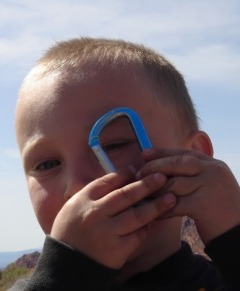 character that was shaped and forged by a wild and untamed landscape.
character that was shaped and forged by a wild and untamed landscape.
We will reveal to the world that our character is built on more than money, that we respect and value the wisdom and gifts our ancestors gave us, and that we fight for our ideals because it’s who we are and who we will continue to be. And maybe, more importantly, we will leave behind for those coming after us the legacy of caring enough about each other to preserve our wild lands as sanctuaries for anyone seeking a momentary reprieve from a hurting and angry man-made world.
